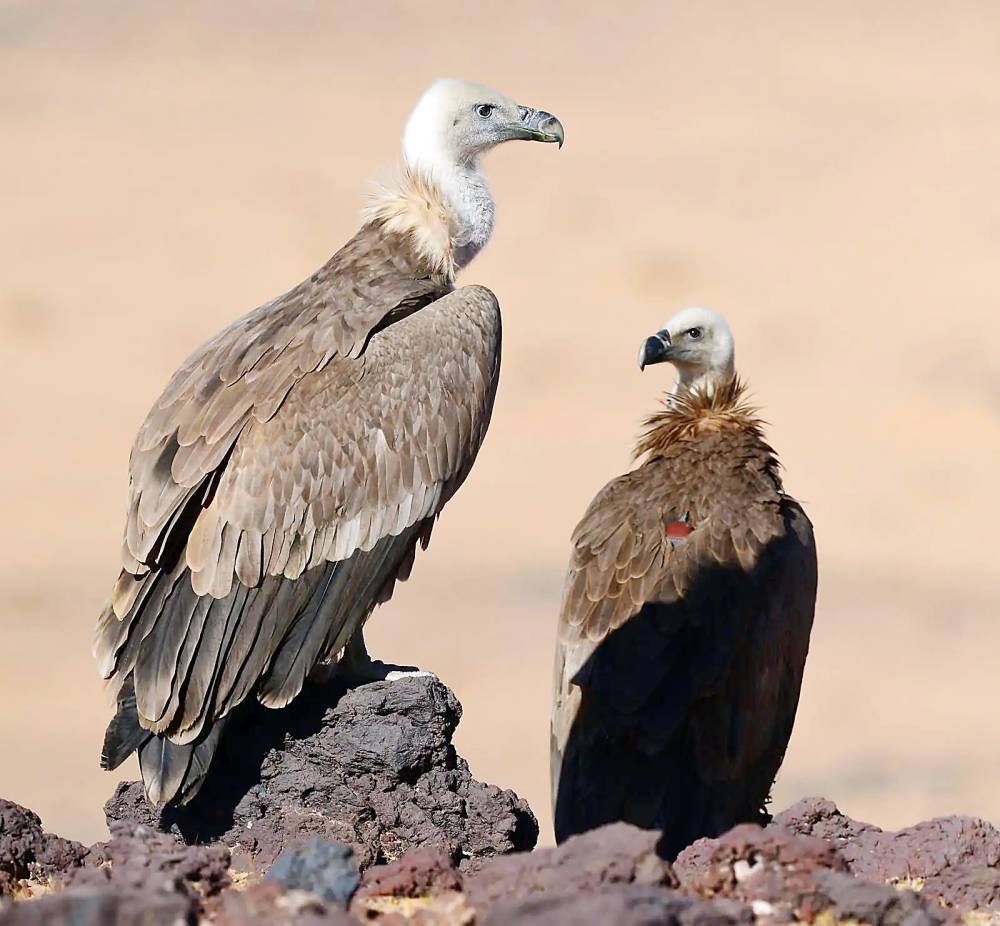Two Eurasian brown eagles have traveled long distances across multiple countries. The Prince Mohammed bin Salman Royal Reserve revealed data recorded by tracking devices attached to two endangered Eurasian brown eagles, showing they covered 245,632 kilometers across 8 countries over the past 29 months.
This real-time data is the first of its kind in the Kingdom and was released on the occasion of the International Vulture Awareness Day to highlight the global challenges facing vulture conservation and emphasize the need to enhance international cooperation in environmental protection to ensure the survival of these species.
The reserve released the two birds on April 3, 2023. The first eagle covered 119,499 kilometers from northwest Saudi Arabia through Jordan, Syria, Iraq, Turkey, Armenia, Azerbaijan, and Iran, returning in winter 2023 to southwest Saudi Arabia via the reserve, then migrating north in spring 2024, settling since then in the mountains of Armenia and Azerbaijan. The eagle has flown at altitudes up to 6,527 meters above sea level and speeds reaching 123 km/h in air temperatures ranging from 9 to 54 degrees Celsius.
The second bird departed from the reserve towards Iraq, flying at altitudes up to 9,029 meters above sea level (equivalent to three times the altitude of a light aircraft) and speeds up to 128 km/h before settling in the Lesser Caucasus mountains in Turkey and Iran. Tracking devices recorded it covering 126,133 kilometers across Saudi Arabia, Jordan, Iraq, Turkey, and Iran. This data indicated behavioral differences among individuals of the same species between migration and settlement.
Andrew Zaloumis, CEO of the Prince Mohammed bin Salman Royal Reserve, explained that the tracking data represents the first comprehensive study of Eurasian brown eagle behaviors inside and outside the Kingdom. The data reveals the two birds covered a distance equivalent to six trips around the Earth in less than two and a half years, highlighting the importance of treating migratory bird flocks as transboundary subpopulations for their conservation.
The reserve cooperated with the National Center for Wildlife to rehabilitate two rescued Eurasian brown eagles and release them into the wild in April 2023. They were equipped with solar-powered satellite tracking devices to monitor their movement and migration patterns after release. The reserve, covering 24,500 square kilometers, was chosen as an ideal habitat for nesting and settling of the Eurasian brown eagle. The devices will automatically detach after three years as the Teflon straps degrade.
Vultures Face an Unprecedented Crisis
Vultures face an unprecedented global crisis in environmental protection efforts. Despite their vital role in maintaining ecosystem health and preventing disease spread by keeping nature clean, all vulture species are listed as endangered on the IUCN Red List. Vultures remain highly sensitive to poisoning, whether intentional or accidental, alongside threats from habitat loss, illegal hunting for trade, and electrocution from power lines.
The data collected by the reserve enables precise management strategies. The tracked birds helped identify locations of resident and migratory vultures, allowing monitoring teams to focus efforts on specific sites within the reserve. Consequently, the reserve now monitors both tagged and untagged vultures, ensuring the highest protection levels for these habitats according to the reserve’s zoning plan. In September 2024, these efforts led to the discovery of 4 active nests of Eurasian brown eagles in 3 scattered breeding colonies, reflecting the reserve’s success as a natural sanctuary for the Kingdom’s environmental heritage.













Recommended for you
Exhibition City Completes About 80% of Preparations for the Damascus International Fair Launch
Talib Al-Rifai Chronicles Kuwaiti Art Heritage in "Doukhi.. Tasaseem Al-Saba"
Unified Admission Applications Start Tuesday with 640 Students to be Accepted in Medicine
Egypt Post: We Have Over 10 Million Customers in Savings Accounts and Offer Daily, Monthly, and Annual Returns
His Highness Sheikh Isa bin Salman bin Hamad Al Khalifa Receives the United States Ambassador to the Kingdom of Bahrain
Al-Jaghbeer: The Industrial Sector Leads Economic Growth